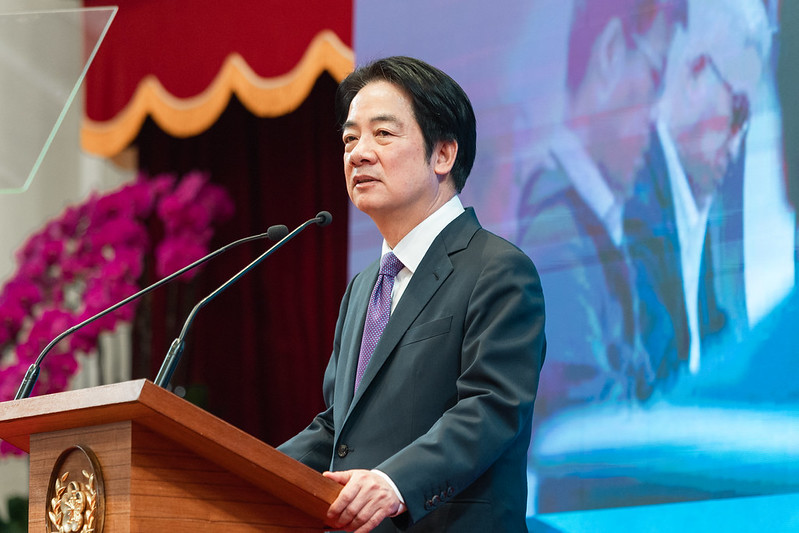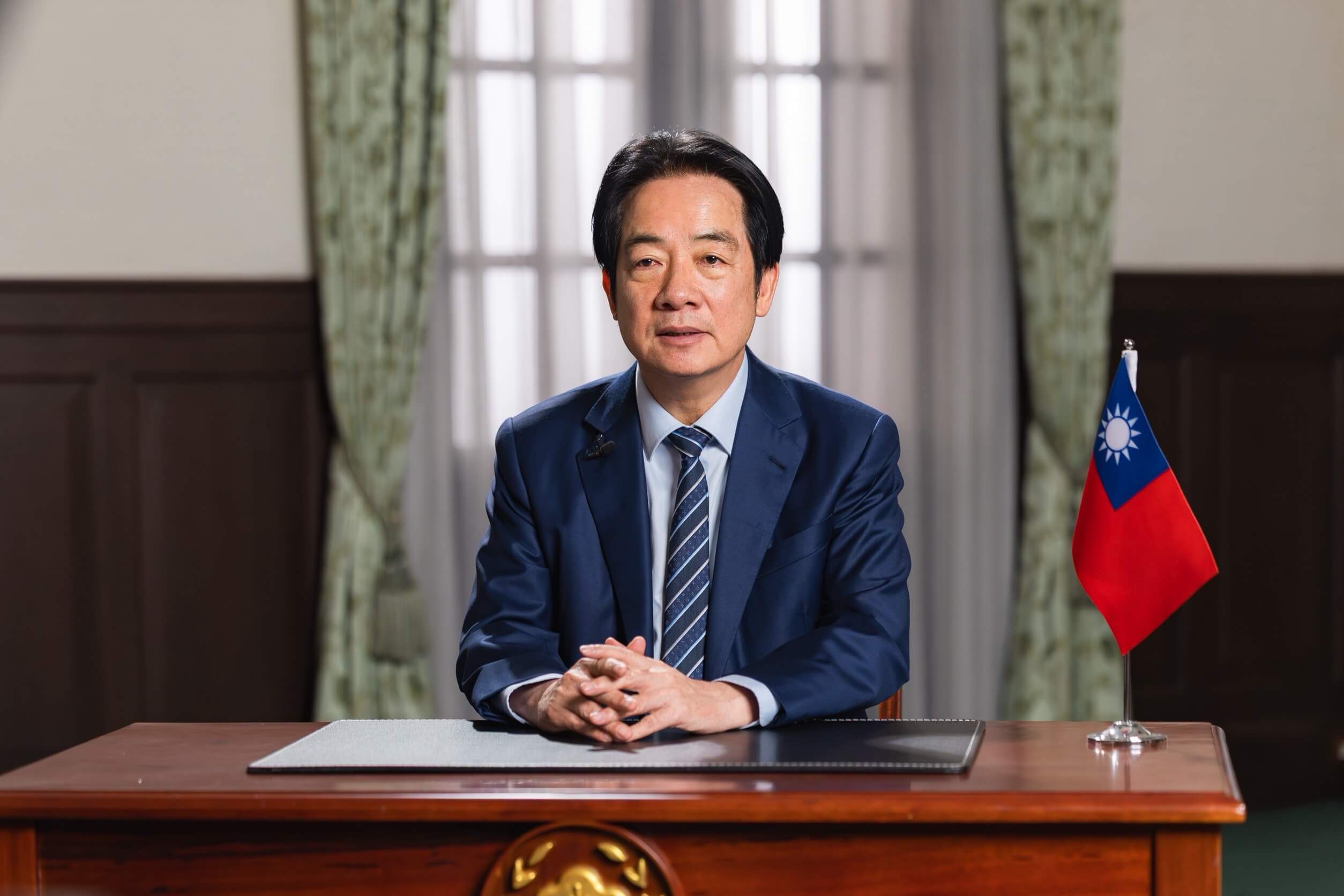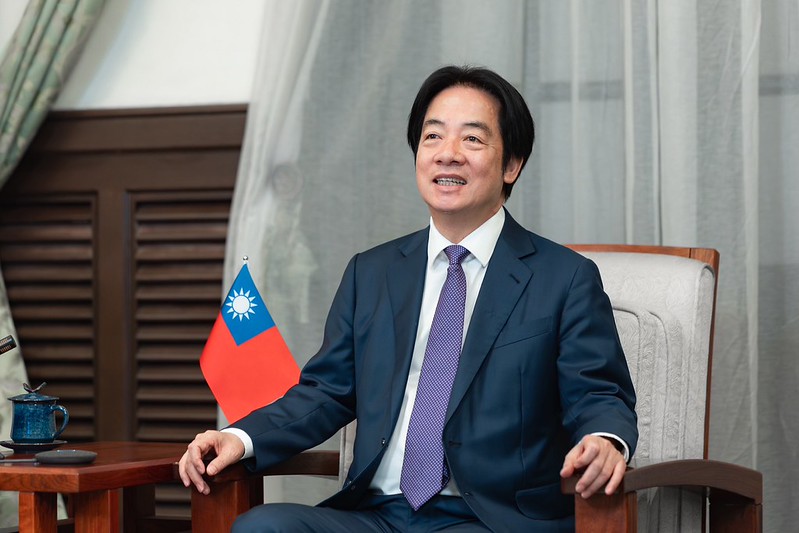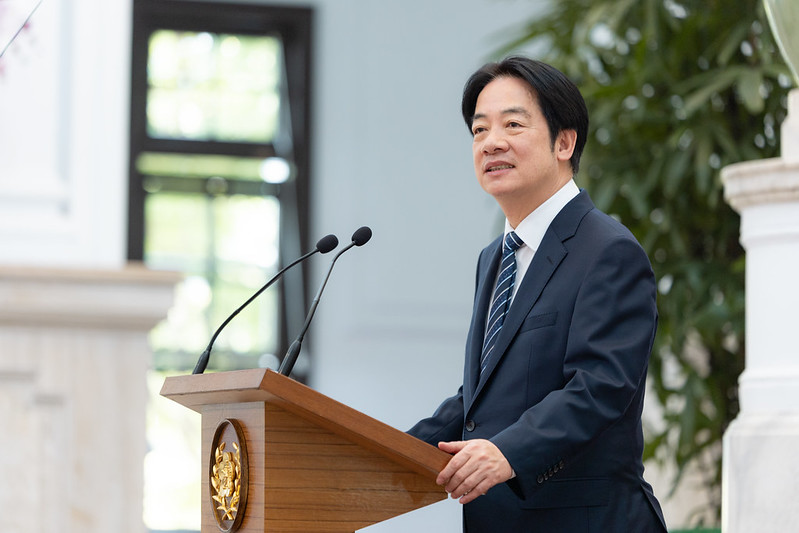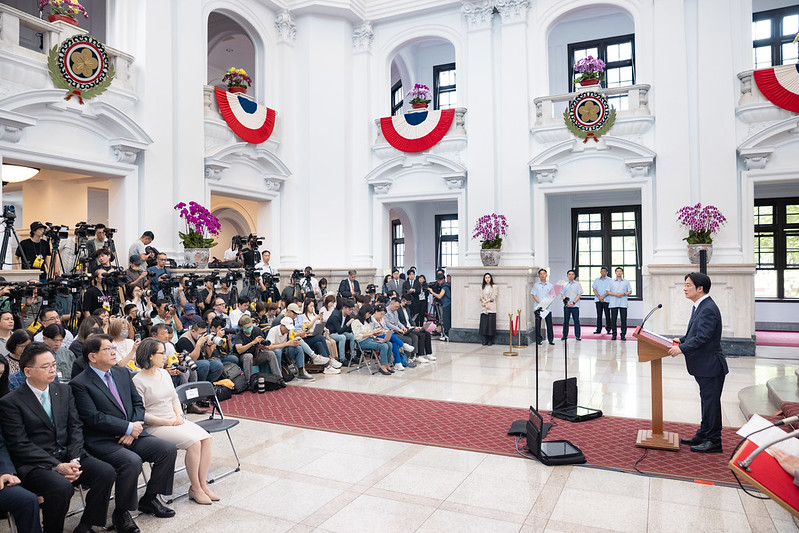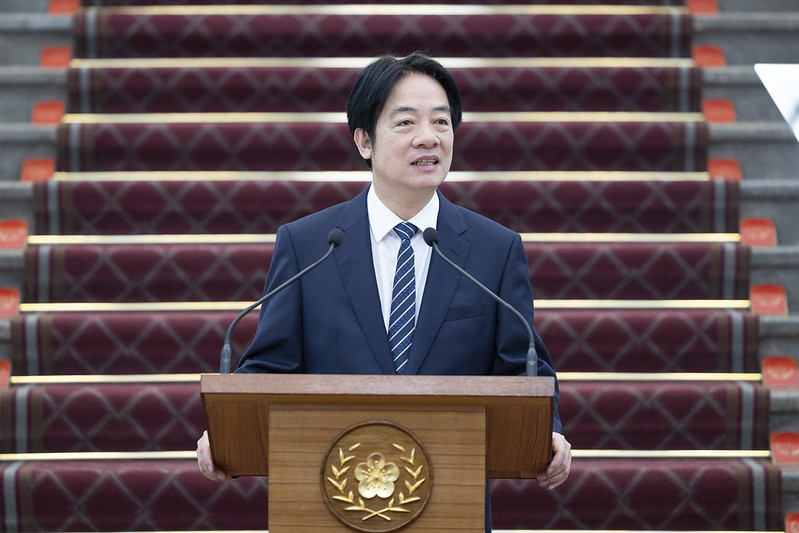News & activities
 News releases
News releases
On the morning of May 20, President Lai Ching-te delivered an address on the first anniversary of his taking office. In his address, the president stated that the Taiwan of today is a Taiwan of the world, and whether it is global technological development, divisions of labor within international supply chains, worldwide economic and trade exchanges, or regional security matters, Taiwan plays a pivotal and indispensable role. He said that, looking forward, we will not cower in the face of challenges; rather, we will bravely march forward into the future. We will maintain solidarity, he emphasized, and with our resilience, perseverance, and enthusiasm as Taiwanese, forge ahead with transition, steadily and solidly.
President Lai stated that moving forward, the government will set up a fund to boost Taiwan’s economic momentum. He also stated that he will be instructing the national security team to initiate a major national security briefing for the chairs of opposition parties, in the hope that leaders of all parties can prioritize our nation’s interests and uphold our nation’s security so that we can tackle our nation’s challenges side by side.
A translation of President Lai’s address follows:
Yesterday, outside of Beida Elementary School in New Taipei City’s Sanxia District, there was a major traffic accident that, sadly, claimed several lives and resulted in multiple injuries. The Executive Yuan immediately formed a task force, and last night I personally visited the victims in hospital. Central government agencies and the local government will cooperate to provide assistance to the victims’ families. They will work as quickly as possible to determine the cause of the accident and assess areas for improvement, so as to prevent reoccurrence of accidents like this. Today, let me express my deepest condolences to the bereaved families for the unfortunate loss of life and my hope for the quick and full recovery of those injured.
The purpose of government is to serve the people. I want to thank the people of Taiwan for entrusting me, one year ago today, with the responsibility of leading the nation bravely forward. I want to thank all my fellow citizens for working hand in hand with the government over this past year. Together, we have overcome numerous challenges to ensure that our nation will keep moving forward.
As we face three major challenges that receive international attention and create the largest impact on our citizens: climate change, the promotion of health, and social resilience, I decided to establish three committees at the Presidential Office. In each committee, we have thus far seen incremental progress.
We are working to align ourselves with international standards. The voluntary bottom-up plans of different government agencies plus the top-down approach of the Executive Yuan National Council for Sustainable Development’s Net Zero Emissions Transition Taskforce have produced 20 flagship carbon reduction projects for six major sectors. The government is expected to continue to inject over NT$1 trillion in the budget for the net-zero transition by 2030; and we expect to spur at least NT$5 trillion in private green investment and financing as we work toward the new 2035 NDC target for emissions reductions of 38±2 percent.
Taiwan’s air quality has been steadily improving. From 2015 to today, the annual average PM2.5 concentration has dropped from 21.82 to 12.8 μg/m3. Taiwan officially began collecting fees for its carbon fee system this year. With firm resolve, a steady pace, and flexible strategies, we will work to realize the vision of net-zero transition by 2050; and together with the world we will pursue sustainable growth and prosperous development.
To address the challenges in the post-pandemic world, we are establishing a national center for disease prevention and control, strengthening our central pandemic response. To promote health for all, we are promoting cancer screening, establishing a fund for new cancer drugs, and launching the five-year, NT$48.9 billion Healthy Taiwan Cultivation Plan. This year, we significantly increased the total National Health Insurance budget by NT$71.2 billion to achieve sustainable NHI development. We aim to create a Healthy Taiwan, keeping people healthy and making the nation stronger so that the world embraces Taiwan.
We are also hard at work to enhance our whole-of-society defense resilience. In addition to continuing to assess various aspects of preparedness at the national level and conduct field verification, we have concerted the efforts of various ministries to propose 17 major strategies to respond to national security and united front threats, uniting our people to resist division and protecting our cherished free and democratic way of life. Recently, the Executive Yuan made special budget allocations of NT$410 billion, of which NT$150 billion is aimed to enhance national resilience. On this, we look forward to mutual support from the ruling and opposition parties.
As our nation continues on the path forward, challenges and obstacles will continue to emerge. Early last month, the United States announced its new tariff policy, and in response I proposed five major strategies. I also launched industry listening tours, with the aim of working alongside industries to overcome challenges and open up new opportunities.
The Executive Yuan is also soliciting opinions from all sectors as quickly as possible to put forward a special act to enhance the resilience of Taiwan’s national security. The annual surplus will be utilized in the special budget allocations totaling NT$410 billion to not only support industries and stabilize employment, but also strengthen the economy, protect people’s livelihoods, enhance resilience in homeland security, and ensure that Taiwan’s industries continue to steadily advance amidst changing circumstances.
Notably, in our discussions across different industries, all sectors advocated against raising electricity prices and were in support of government subsidies for Taiwan Power Company. These would offset Taipower’s losses from subsidies to support people’s livelihoods and for industrial electricity usage since the COVID-19 pandemic and Russo-Ukrainian War, both strengthening its finances and stabilizing electricity prices. We look forward to cooperation among the ruling and opposition parties to pass the Executive Yuan’s special budget.
All sectors hope to maintain a stable power supply. As energy security is national security, ensuring a stable power supply while developing more forms of green energy is, whether now or in the future, one of the government’s most important tasks.
Aside from the issue of electricity prices, the Taiwanese people have also been closely following the recent Taiwan-US tariff negotiations. The first round of in-person talks have concluded, and tariff negotiations are currently still going smoothly. The government will uphold the principles of ensuring national interests and safeguarding industry development, under no circumstances sacrificing any one sector. We will stand firm on Taiwan’s position and, from the basis of deepening Taiwan-US economic and trade relations, strive for optimal negotiation results in a well-paced, balanced manner.
Taiwan shares democratic values with our democratic partners around the world. When combined with our adherence to free market principles to foster mutual prosperity, those values are our greatest assets. They form a protective umbrella that allows Taiwanese businesses to unleash their vitality and energy. They are also the most significant mark of distinction between us and authoritarian regimes.
For many years now, Taiwan, the US, and our democratic partners have actively engaged in exchange and cooperation, spurring mutual growth. Among friends, there is always some friction; but that friction is always resolvable. Just as it says in the Bible, “As iron sharpens iron, so one person sharpens another.” Through mutual exchange, friends can smooth out their shortcomings and further hone their strengths. Even when differences arise, so long as there is a foundation built on trust and honest dialogue, friends can better understand one another and further deepen their bonds.
Now, Taiwan’s market is global; its stage is international. Going forward, we will hold firm to our democratic values and expand into diverse markets.
First, Taiwan’s economic path is clearly established. Taking a market-oriented approach, we will promote an economic path of staying firmly rooted in Taiwan and expanding the global presence of our enterprises while strengthening ties with the US. In recent years, Taiwan has updated investment protection agreements with such countries as the Philippines, India, Vietnam, and Thailand, and signed a foreign investment promotion and protection arrangement with Canada. Moving forward, we will endeavor to sign investment protection agreements and double taxation avoidance agreements with our friends and allies.
Second, Taiwan’s trade strategy is clearly defined. We will extend our market connections with the US and other free, democratic nations, expanding our presence worldwide. To that end, we have completed the signing of the first agreement under the Taiwan-US Initiative on 21st-Century Trade and signed an enhanced trade partnership arrangement with the United Kingdom. We are in active negotiations on trade agreements with other countries, and we continue to seek admission to the Comprehensive and Progressive Agreement for Trans-Pacific Partnership and other mechanisms for regional economic integration.
Third, we must ensure that Taiwan’s economy is export-led while expanding domestic demand, concurrently prioritizing strong technological R&D and upgraded traditional industries, and boosting software development, production, and manufacturing.
We must also continue tapping into Taiwan’s strengths to attract international firms here to invest and collaborate. In just the past few years, Entegris opened a new manufacturing facility in Kaohsiung, Micron launched a new facility in Taichung, and Google further solidified Taiwan as its biggest R&D hub outside of the US by opening a new office here. AMD, Nvidia, and major cloud computing companies from the US have also been expanding their presence here. And yesterday, Nvidia even announced that it will establish an overseas headquarters in Taiwan. Through such collaboration across borders, we are introducing advanced technology from overseas and engaging in international R&D. We will build Taiwan into an even more resilient economy.
Moving forward, the government will set up a fund to boost Taiwan’s economic momentum. With our sights set on the whole globe, we will invest in international markets, while the government will also set up a sovereign wealth fund and build a national-level investment platform. We will make full use of Taiwan’s industrial advantages and, with the government taking the lead and synergizing private-sector enterprises, expand our global presence and link with major target markets of the AI era.
Domestically, we will bolster local supply chains and strengthen industries’ ability to adapt to changing circumstances. The government will enhance the functions of the National Development Fund to achieve industrial restructuring and assist domestic industries and small- and medium-sized enterprises with upgrading and transformation, raising international competitiveness and consolidating domestic industry foundations.
My fellow citizens, our market and our values are defined by democracy. Democracy is also a display of our national strength. Taiwan was once the country with the world’s longest martial law period, but now, we are a beacon for democracy in Asia.
Our past generations, through valiant sacrifice and devotion, bravely resisted authoritarianism and pursued democracy. Today’s younger generations are able to proactively engage in politics, protect the nation, further entrench democracy, and strive for a diverse Taiwan through all manner of constitutional and legal means, without fear of difficulty. This is the democratic Taiwan we take pride in.
I am confident that no one Taiwanese would give up their free and democratic way of life. And no president can abandon the values of freedom and democracy.
On the path of democracy, Taiwan never relied on the mobilization of hate; rather, it relied on the participation and coming together of citizens. We do not fear differences in opinion because the core of democracy is about finding, within difference, unity.
I have always believed that democratic disputes are resolved through greater exercise of democracy. Over the past year, despite the domestic political situation, ruling and opposition parties formed a delegation to attend the inaugural ceremonies of the president and vice president of the US, demonstrating that democratic Taiwan stands united for deepening Taiwan-US ties. I also, in accordance with the powers granted me by the Constitution, convened a national policy meeting with the heads of the five branches of government, with the hope of achieving reconciliation and encouraging cooperation.
I have always been willing, with open arms, to work hard for cross-party dialogue and strengthened cooperation among our political parties. That is why I will be instructing our national security team to initiate a major national security briefing for the chairs of opposition parties. It is hoped that leaders of all parties, regardless of political stance, can prioritize our nation’s interests and uphold our nation’s security; and grounded in shared facts, we can openly and honestly exchange views and discuss matters of national importance, so that we can tackle our nation’s challenges side by side.
Later today is the opening ceremony of COMPUTEX TAIPEI, an event that will be closely followed in the international community. Taiwan, as the world’s silicon island, is a central pillar in the global economy and the field of AI, and this event will therefore attract important tech industry figures from around the world.
Once a small-scale expo initially held near Taipei’s Songshan Airport, COMPUTEX has continued to grow in scale over the past 40-plus years, and now marks an important milestone in the development of global technological innovation.
COMPUTEX is a microcosm of the Taiwan story, an achievement that the people of Taiwan share. The Taiwan of today is a Taiwan of the world. Whether it is global technological development, divisions of labor within international supply chains, worldwide economic and trade exchanges, or regional security matters, Taiwan plays a pivotal and indispensable role.
My fellow citizens, we do not cower in the face of challenges; rather, we bravely march forward into the future. As the saying goes, success is 30 percent destiny and 70 percent hard work. We will maintain solidarity, and with our resilience, perseverance, and enthusiasm as Taiwanese, forge ahead with transition, steadily and solidly. That is the spirit of us Taiwanese.
We will keep working together in solidarity and meet challenges with firm strides, making Taiwan a global beacon, a pilot for world peace, and a force for global prosperity. Thank you.

